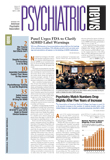Baltimore District Court Judge Charlotte Cooksey looks down from the bench in her courtroom at a man standing at the defense table. She listens to the clinical court coordinator's report.
“Mr. R is in Johns Hopkins Hospital,” says the coordinator.“ He's restarted his antipsychotic medications. He had a psychotic break due to malnutrition, not because he was off his medications, and they're prepping him for discharge. The plan to release him fell through because the program we were going to send him to wouldn't take Medicare.”
The real work of the court happens behind closed doors, squeezed in between Cooksey's regular docket in the morning and the mental health court on Monday and Thursday afternoons. The judge, prosecutor, and defense attorneys discuss the defendants' status and problems and try to come up with an individual plan of action. The public defender or defense attorney takes the proposal back to the defendant, who can accept or reject it.
Here in the courtroom, there's a long bench conference, something about the need for structure in Mr. R's housing setting. The defense attorney comes back to the table and tells Cooksey, “I wish I was Solomon. I'm sure you do sometimes too.”
Cooksey tells Mr. R he's going back to Hopkins and to come back to court in a month. She looks at a woman who's been standing by the barrier separating spectators from the well of the court. “Are you Mr. R's mother? I just wanted to say hello.”
“He's been through a lot,” says Mr. R's mother. “You just don't know the whole thing about it.”
A few more defendants shuffle quietly to the well of the court. Most of the men are handcuffed. Of one, a pretrial officer says: “He's doing fine, taking his medications, negative urinalysis.” Of another, he says:“ He's going to school Monday, Tuesday, and Wednesday and is looking for a job on Thursday and Friday.”
A woman says she got cocky and stopped taking her medications and left her supervised housing. The assistant state's attorney expresses misgivings about continuing. “We'll give it a try and see how it goes,” says Cooksey. “Don't miss any appointments. I want to bring her back in two weeks to see that everything's going all right.”
The afternoon's last case is another woman, hands cuffed behind her. She assaulted and injured a psychiatry resident at Johns Hopkins Hospital. Her public defender explains she's giving up her right to a trial. The woman enters a plea of not criminally responsible. Cooksey pronounces her guilty but unable to appreciate the consequences of her conduct due to mental illness. She's committed to the state department of mental hygiene for treatment, which will set up a treatment plan. “You have to follow the plan, take your medications, and obey the law,” intones Cooksey.
The long day ends. Her courtroom is the last one still working. Outside on the front steps, the public defender catches a little south Baltimore air.“ It's working well,” says Sharon Bogins, J.D. “It keeps them out of jail. It's better for the state and better for the clients.”
